This volume is devoted to the main areas of mathematical logic and applications to computer science. There are articles on weakly o-minimal theories, algorithmic complexity of relations, models within the computable model theory, hierarchies of randomness tests, computable numberings, and complexity problems of minimal unsatisfiable formulas. The problems of characterization of the deduction-detachment theorem, Δ1-induction, completeness of Leśniewski's systems, and reduction calculus for the satisfiability problem are also discussed.The coverage includes the answer to Kanovei's question about the upper bound for the complexity of equivalence relations by convergence at infinity for continuous functions. The volume also gives some applications to computer science such as solving the problems of inductive interference of languages from the full collection of positive examples and some negative data, the effects of random negative data, methods of formal specification and verification on the basis of model theory and multiple-valued logics, interval fuzzy algebraic systems, the problems of information exchange among agents on the base topological structures, and the predictions provided by inductive theories.Contents:Another Characterization of the Deduction-Detachment Theorem (S V Babyonyshev)On Behavior of 2-Formulas in Weakly o-Minimal Theories (B S Baizhanov & B Sh Kulpeshov)Arithmetic Turing Degrees and Categorical Theories of Computable Models (E Fokina)Negative Data in Learning Languages (S Jain & E Kinber)Effective Cardinals in the Nonstandard Universe (V Kanovei & M Reeken)Model-Theoretic Methods of Analysis of Computer Arithmetic (S P Kovalyov)The Functional Completeness of Leśniewski's Systems (F Lepage)Hierarchies of Randomness Tests (J Reimann & F Stephan)Intransitive Linear Temporal Logic Based on Integer Numbers, Decidability, Admissible Logical Consecutions (V V Rybakov)The Logic of Prediction (E Vityaev)Conceptual Semantic Systems Theory and Applications (K E Wolff)Complexity Results on Minimal Unsatisfiable Formulas (X Zhao)and other papersReadership: Researchers in mathematical logic and algebra, computer scientists in artificial intelligence and fuzzy logic.

